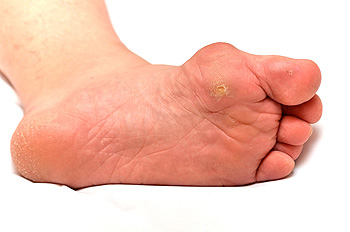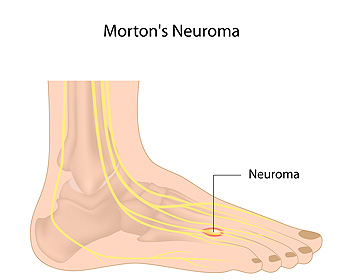Connect With Us
Blog
Do Feet Become Larger During Pregnancy?
 Many pregnant women notice their feet become larger as their pregnancy develops. This is often a result of additional weight gain caused by the growing fetus. Changes in hormone levels may cause the joints in the feet to become loose. Swollen feet are a common symptom that affect many pregnant women. Mild relief can be found while resting and elevating the feet. Additionally, it may be beneficial to perform gentle foot stretches, and this can be helpful in reducing excess fluid that may accumulate in the feet. It is important to wear shoes that fit correctly, and can offer the correct amount of support. Some pregnant women find it helpful to wear compression stockings in addition to wearing insoles, as they can add to the support of the shoe. If you have questions about how pregnancy affects the feet, please consult with a podiatrist who can provide you with the best information and recommendations.
Many pregnant women notice their feet become larger as their pregnancy develops. This is often a result of additional weight gain caused by the growing fetus. Changes in hormone levels may cause the joints in the feet to become loose. Swollen feet are a common symptom that affect many pregnant women. Mild relief can be found while resting and elevating the feet. Additionally, it may be beneficial to perform gentle foot stretches, and this can be helpful in reducing excess fluid that may accumulate in the feet. It is important to wear shoes that fit correctly, and can offer the correct amount of support. Some pregnant women find it helpful to wear compression stockings in addition to wearing insoles, as they can add to the support of the shoe. If you have questions about how pregnancy affects the feet, please consult with a podiatrist who can provide you with the best information and recommendations.
Pregnant women with swollen feet can be treated with a variety of different methods that are readily available. For more information about other cures for swollen feet during pregnancy, consult with one of our podiatrists from Foot & Ankle Associates of Maine. Our doctors will attend to all of your foot and ankle needs.
What Foot Problems Can Arise During Pregnancy?
One problem that can occur is overpronation, which occurs when the arch of the foot flattens and tends to roll inward. This can cause pain and discomfort in your heels while you’re walking or even just standing up, trying to support your baby.
Another problem is edema, or swelling in the extremities. This often affects the feet during pregnancy but tends to occur in the later stages.
How Can I Keep My Feet Healthy During Pregnancy?
- Wearing orthotics can provide extra support for the feet and help distribute weight evenly
- Minimize the amount of time spent walking barefoot
- Wear shoes with good arch support
- Wear shoes that allow for good circulation to the feet
- Elevate feet if you experience swelling
- Massage your feet
- Get regular, light exercise, such as walking, to promote blood circulation to the feet
If you have any questions please feel free to contact our office located in Brunswick, ME . We offer the newest diagnostic and treatment technologies for all your foot and ankle needs.
It's Time for Beautiful Feet
How Do I Know If I Have A Bunion?
 The most noticeable symptom of a bunion is a large bony protrusion on the side of the big toe. It is considered to be a bone deformity, and can occur as a result of genetic factors, or from wearing shoes that do not have adequate room for the toes to move freely in. It can cause the big toe to gradually move toward the other toes, and it may become difficult to wear shoes. Many patients purchase larger size shoes to attain comfort, in addition to wearing bunion pads which may help to ease any friction that may be present. Additional reasons for this condition to occur can include having low arches, injuries that have happened to the feet, or medical conditions such as rheumatoid arthritis. Some of the symptoms that are associated with this ailment can consist of pain and discomfort surrounding the affected area, the formation of corns and calluses on top of the bunion, and it may be difficult to move the toe. If you have a bunion, it is advised that you consult with a podiatrist who can recommend correct treatment options, which may include surgery for permanent removal of the bunion.
The most noticeable symptom of a bunion is a large bony protrusion on the side of the big toe. It is considered to be a bone deformity, and can occur as a result of genetic factors, or from wearing shoes that do not have adequate room for the toes to move freely in. It can cause the big toe to gradually move toward the other toes, and it may become difficult to wear shoes. Many patients purchase larger size shoes to attain comfort, in addition to wearing bunion pads which may help to ease any friction that may be present. Additional reasons for this condition to occur can include having low arches, injuries that have happened to the feet, or medical conditions such as rheumatoid arthritis. Some of the symptoms that are associated with this ailment can consist of pain and discomfort surrounding the affected area, the formation of corns and calluses on top of the bunion, and it may be difficult to move the toe. If you have a bunion, it is advised that you consult with a podiatrist who can recommend correct treatment options, which may include surgery for permanent removal of the bunion.
If you are suffering from bunion pain, contact one of our podiatrists of Foot & Ankle Associates of Maine. Our doctors can provide the care you need to keep you pain-free and on your feet.
What Is a Bunion?
Bunions are painful bony bumps that usually develop on the inside of the foot at the joint of the big toe. As the deformity increases over time, it may become painful to walk and wear shoes. Women are more likely to exacerbate existing bunions since they often wear tight, narrow shoes that shift their toes together. Bunion pain can be relieved by wearing wider shoes with enough room for the toes.
Causes
- Genetics – some people inherit feet that are more prone to bunion development
- Inflammatory Conditions - rheumatoid arthritis and polio may cause bunion development
Symptoms
- Redness and inflammation
- Pain and tenderness
- Callus or corns on the bump
- Restricted motion in the big toe
In order to diagnose your bunion, your podiatrist may ask about your medical history, symptoms, and general health. Your doctor might also order an x-ray to take a closer look at your feet. Nonsurgical treatment options include orthotics, padding, icing, changes in footwear, and medication. If nonsurgical treatments don’t alleviate your bunion pain, surgery may be necessary.
If you have any questions, please feel free to contact our office located in Brunswick, ME . We offer the newest diagnostic and treatment technologies for all your foot care needs.
Nerve Damage May Lead to Morton’s Neuroma
 Pain and discomfort that is felt on the ball of the foot may indicate the presence of a condition that is known as Morton’s neuroma. Additionally, the pain may be felt at the base of the toes, and patients have noticed that it feels like they are standing on pebbles. Other symptoms can include numbness or tingling, and walking may be difficult. A common cause of this condition is wearing shoes that are too tight, and which do not have adequate room for the toes to move freely in. Wearing these types of shoes can cause irritation in the nerve, gradually putting pressure on that portion of the foot. There are existing medical conditions that are often associated with Morton’s neuroma. These can include bunions, hammertoes, and flat feet. After a proper diagnosis is performed, mild relief can be found in performing stretching techniques that may be helpful in loosening the tendons, in addition to elevating and massaging the affected foot. Please consult with a podiatrist if you feel you may have developed Morton’s neuroma, so that the proper treatment can begin.
Pain and discomfort that is felt on the ball of the foot may indicate the presence of a condition that is known as Morton’s neuroma. Additionally, the pain may be felt at the base of the toes, and patients have noticed that it feels like they are standing on pebbles. Other symptoms can include numbness or tingling, and walking may be difficult. A common cause of this condition is wearing shoes that are too tight, and which do not have adequate room for the toes to move freely in. Wearing these types of shoes can cause irritation in the nerve, gradually putting pressure on that portion of the foot. There are existing medical conditions that are often associated with Morton’s neuroma. These can include bunions, hammertoes, and flat feet. After a proper diagnosis is performed, mild relief can be found in performing stretching techniques that may be helpful in loosening the tendons, in addition to elevating and massaging the affected foot. Please consult with a podiatrist if you feel you may have developed Morton’s neuroma, so that the proper treatment can begin.
Morton’s neuroma is a very uncomfortable condition to live with. If you think you have Morton’s neuroma, contact one of our podiatrists of Foot & Ankle Associates of Maine. Our doctors will attend to all of your foot care needs and answer any of your related questions.
Morton’s Neuroma
Morton's neuroma is a painful foot condition that commonly affects the areas between the second and third or third and fourth toe, although other areas of the foot are also susceptible. Morton’s neuroma is caused by an inflamed nerve in the foot that is being squeezed and aggravated by surrounding bones.
What Increases the Chances of Having Morton’s Neuroma?
- Ill-fitting high heels or shoes that add pressure to the toe or foot
- Jogging, running or any sport that involves constant impact to the foot
- Flat feet, bunions, and any other foot deformities
Morton’s neuroma is a very treatable condition. Orthotics and shoe inserts can often be used to alleviate the pain on the forefront of the feet. In more severe cases, corticosteroids can also be prescribed. In order to figure out the best treatment for your neuroma, it’s recommended to seek the care of a podiatrist who can diagnose your condition and provide different treatment options.
If you have any questions, please feel free to contact our office located in Brunswick, ME . We offer the newest diagnostic and treatment technologies for all your foot care needs.

